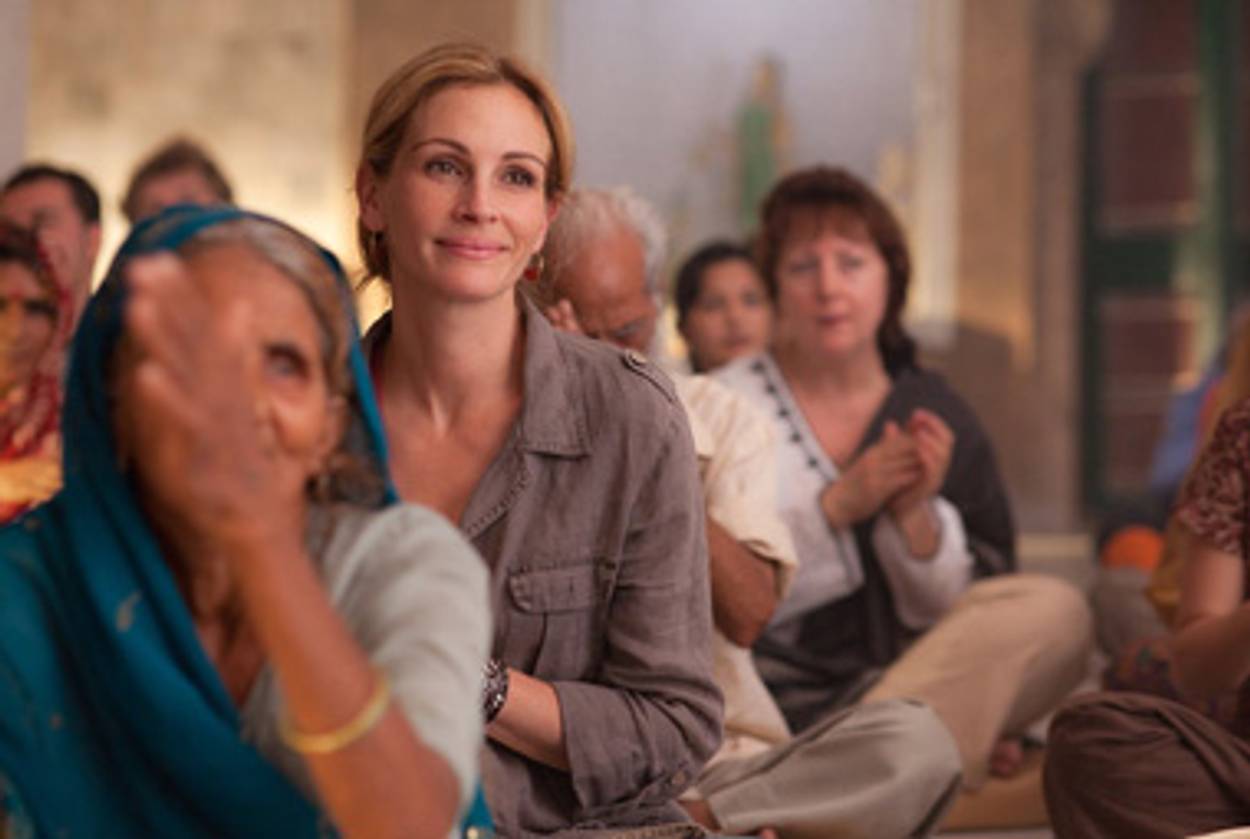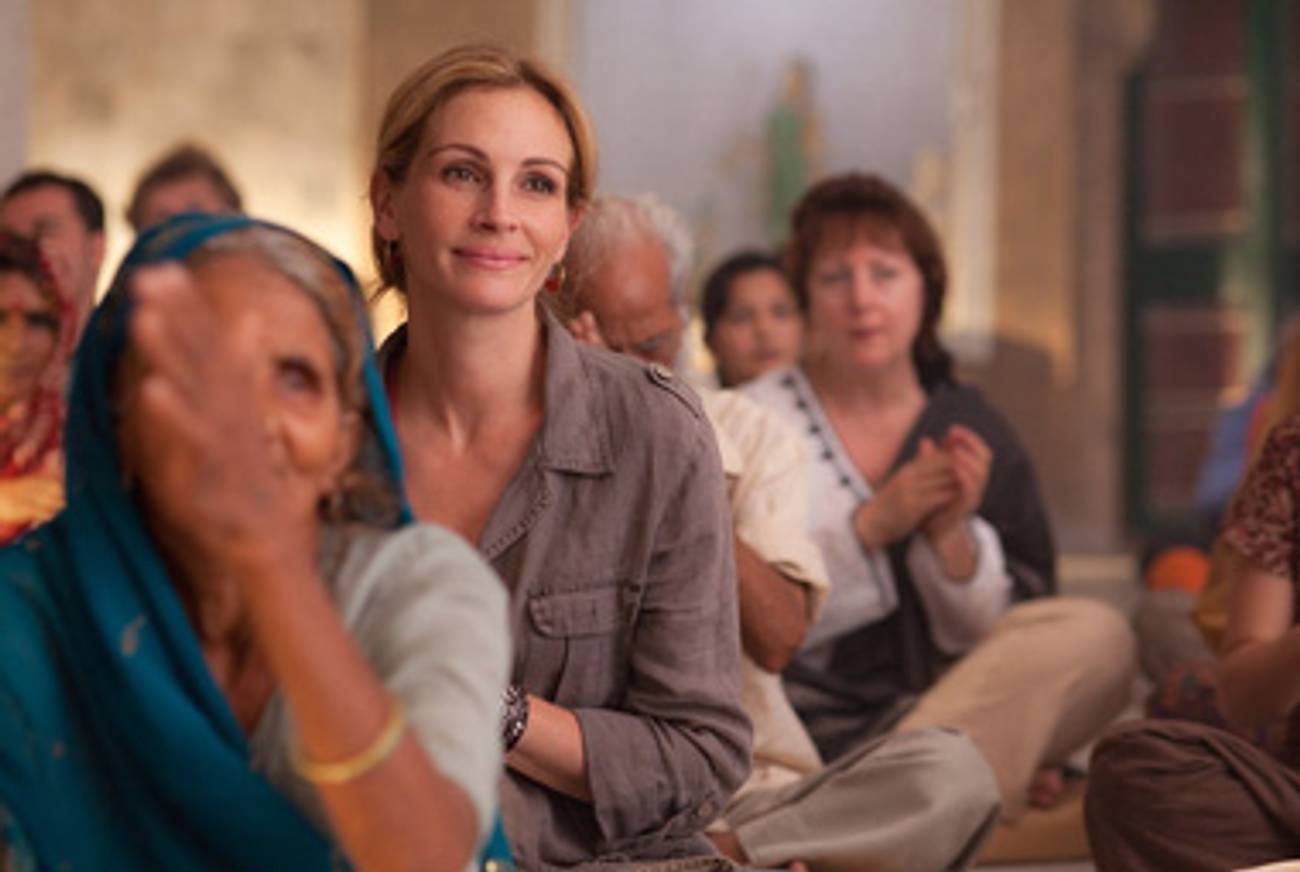Eat, Pray, Love Your Brother
The Julia Roberts blockbuster—and the Elizabeth Gilbert memoir it’s based on—get the prayer part all wrong




I would rather sit on a stoop in the rain than see Eat Pray Love. In fact, I did just that. Last weekend, my kids were attending a drop-off birthday party at a movie theater, which not only spared me from having to sit through Cats and Dogs: The Revenge of Kitty Galorebut allowed me to attend a movie all by myself. Four out of five moms agree: Getting to sit in the dark theater, with no one tugging on you, eating trans-fat-laden popcorn, is one of the greatest joys in life. But the only movie playing at the same time was Eat Pray Love. So, I went to sit on a stoop in the rain to wait for the end of Kitty Galore.
You see, I read the book. And it infuriated me. I loved the beginning passionately, then felt increasingly angry and hoodwinked as it went on. The Elizabeth Gilbert who went to Italy to rediscover food and sensory pleasures after the breakup of her marriage was hilarious and witty. I loved her description of the “gorgeous flower-chain of curses” tossed onto a soccer field by an old Italian man watching the game. I loved that she was an unabashed word nerd like me, telling us that the word for fan in Italian is “tifoso,” derived from the word for typhus—“in other words, one who is mightily fevered.” I loved that she lusted for her young Roman conversation partners but knew that acting on that lust was a mistake.
Oh, I knew Gilbert had done some stupid things in the past. But she owned them. I respected the way she was cryptic about what killed her marriage—she was protecting her husband. I liked the way she was rueful about her self-destructive passion for a younger actor/writer/poet/yogi. When Gilbert took off for Italy, leaving both ex-husband and lover behind, I rooted for her. I rejoiced as she began to eat again. I wanted to suck down plates of pasta with her and giggle over glasses of Barolo. She was my buddy.
But then she left Italy. She went to India to learn how to pray. And I started to turn on her. At first, I made excuses for her inability to write about faith and grace with the same charm she conjured up when she wrote about food. After all, Anne Lamott had the same trouble in Traveling Mercies; it’s hard to make something as internal as spirituality feel immediate. The writing-class rule is “show, don’t tell,” but how do you externalize belief? The book began to feel labored. When Liz wrote about her difficulty meditating and being silent, her self-deprecation started to come off as cutesy. The chattiness I’d loved in Italy was starting to feel glib.
And then one scene pulled the yoga mat out from under me completely.
It’s the scene in which—spoiler alert—Gilbert has a revelatory, out-of-body meeting with her husband’s spirit on an ashram rooftop. She and her husband’s spirit forgive each other, and it is beautiful. The divide between them is gone. Suddenly, his anger and hurt evaporate, because she and he have transcended their earthly selves and their souls have communed.
I was infuriated by Gilbert’s creation of a situation in which she’s been absolved, in which her husband’s soul has done something the man himself could not. It felt like the laziest sort of self-justifying hippie nonsense. I think you have to live with people not liking you. And it’s hard for people like Gilbert (and me), people who really want to be liked, but that is the real work, accepting that not everyone will like you. It’s harder than creating a transcendent moment in which the other person really does forgive you, even if he doesn’t know it consciously.
Of course, I can’t know that Gilbert’s ex’s spirit didn’t meet hers on the astral plane. But I think it’s much more challenging and meaningful to accept that you may never receive absolution. It is braver—and I think more Jewish—to do everything in your power to make right the wrong you’ve done and still acknowledge that forgiveness may not be granted. It’s miserable to live with loose ends. It’s prettier to conjure up resolutions. But it isn’t authentic.
I finished the book because I am a masochist, but I was seething. So much self-examination to so little end! Maybe I just can’t escape my earthly Jewish guilt and perpetual ambivalence about everything. I realize that Elizabeth Gilbert isn’t Jewish, and she’s more than entitled to her own freeform spirituality. But it made me start thinking about how Judaism is more about community than self-acceptance. Ours is not a full-on feel-good religion, like Gilbert’s version of Christi-Bu-ism. But neither is it self-aggrandizing pablum. I do believe the world would be a better place if we spent more time turned outward than inward.
I think back to when I lived in San Francisco and heard so many High Holiday sermons about self-forgiveness—so much talk about forgiving ourselves, so little emphasis on apologizing to others. I think the reason I’m more comfortable with the word “religion” than the word “spirituality” is that religion involves doing rather than just thinking and feeling. Meditation and silence aren’t enough. Healing the world—the actual, physical world—is a more lasting goal.
I don’t want to be too hard on Gilbert. I actually think she did heal the world—her book made people happy. (Not me. Other people.) That’s nothing to sneeze at. Helping readers forget their troubles for a while, letting them in on a life of world travel and adventure, is a mitzvah. I understand that the real Elizabeth Gilbert is a lovely and charitable person. I am glad that she—another spoiler alert—found love again, and I don’t begrudge her a kid-free footloose life, a gazillion dollars, or the privilege of being played by a toothy movie star with lots of hair. But I still think the Jewish takeaway is that Eat Pray Love’s spiritual vision may be a nice place to visit, but we shouldn’t want to live there.
Marjorie Ingall is a columnist for Tablet Magazine, and author of Mamaleh Knows Best: What Jewish Mothers Do to Raise Successful, Creative, Empathetic, Independent Children.
Marjorie Ingall is a former columnist for Tablet, the author of Mamaleh Knows Best, and a frequent contributor to the New York Times Book Review.